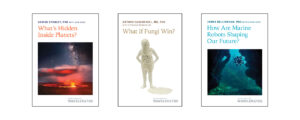

“Writing Can We Trust AI? with Wall Street Journal science reporter Eric Niiler led me to form better explanations to address AI fears for non-academic audiences, and write stronger narratives about broad impacts for grant applications.” —Dr. Rama Chellappa
Research fuels the engine of progress; Wavelengths brings the benefits of its discoveries to the world through the development, dissemination, and promotion of accessible, engaging, and strategic content for diverse audiences.
In classrooms, field stations, and laboratories in Baltimore, Washington, D.C., and around the world, the researchers of Johns Hopkins University are opening the boundaries of our understanding of many of the world’s most complex challenges and fascinating opportunities. Wavelengths brings listeners, readers, viewers, and visitors inside their stories, presenting the pioneering discoveries, innovations, and viewpoints that benefit people in their neighborhoods and across the globe. Through the compelling narratives of our nonfiction books—and the media coverage, events, and creative partnership projects they prompt—the researchers’ insights spark curiosity, hope, and wonder, leading to conversations in dorm rooms, dining rooms, boardrooms, and the offices of government representatives—including the Oval Office.
Wavelengths is a partnership between the Johns Hopkins University Press and Office of the Vice Provost for Research. We encourage a diversity of authors, topics, and perspectives, and assure that our content is accessible (clear language, free open access content, public events), accurate, and engaging. Books in the series include:
Are you a Hopkins researcher who’s interested in engaging with diverse audiences?
Explore participation in the program here.
The Wavelengths name is inspired by the forms of connective and generative power moving throughout the Earth and the universe, with a nod to the meaning of the word as being in sync with someone else’s perspective. In a similar vein, we dedicate our energies to creating dynamic and engaging means of sharing the work of Hopkins researchers across the globe, connecting people through hope and knowledge. The logo was designed by Matthew Cole.
Vice Provost for Research
265 Garland Hall
3400 North Charles Street
Baltimore, MD 21218
(443) 927-1957
